#which is a whole other problem for western politics as a whole
Explore tagged Tumblr posts
Text
i wish women in the “traditional femininity” sphere would understand that the POINT of feminism is not "to make them personally happy" or "to validate their feelings and lifestyle choices (e.g. being a SAHM, having a successful marriage, enjoying fashion and beauty, etc.)". The point of our movement is to make life materially better for as many women and girls as possible. Personal fulfillment and happiness is a personal project, not a political goal.
#sorry but I spend A LOT of time in those spheres#mostly because I am interested in understanding the perspectives of as many women as possible#and unfortunately the average ~traditional woman~ seems to hold extremely liberal feminist views ironically#she seems to believe that all of her personal choices should be viewed as feminist and part of women's empowerment#merely because she is a woman making that choice and it makes her happy personally#and they seem comfortable disavowing feminism because it doesn't fit in with their personal sense of identity#which is a whole other problem for western politics as a whole#we see them as personal identities.... like consumer products that we can just buy at will#instead of political movements#its like...if feminism isn't marketed to them like the products they like to buy are then they don't see the purpose in purchasing it#it's just a fucked up and sad way of thinking#i literally NEVER hear these women speak about actual political goals or the rights of women and girls#just their own personal life and self improvement goals#they truly think their space is more empowering because it offers them practical tips on how to ~glow up~#because that is truly what they think political action amounts to
10 notes
·
View notes
Text
I was today years old when I found out that the Iraq war wasn't actually about oil.
I don't know why this feels so much more evil than if they did it for some kind of material gain. They honestly just wanted terrorise the whole world to establish that they're the top dog and always will be. And they chose the most isolated, vulnerable countries to do it.
That would mean that the West's support for the Palestinian genocide is nothing other than they want to show how big and tough they are and that Israel is an extension of themselves and always will be, so Iran, Lebanon, Yemen and Syria had better watch themselves.

#so this post and the replies rearranged my worldview#The US and NATO are also probably mad that so many Global South countries are resisting fully committing support for them by antagonizing R#The whole “not our problem” attitude signals that their influence and hegemonic power over the rest of the world has vaned#which is unacceptable. So it wants to send Russia's allies‚ specifically Iran#a message about what happens when you fuck with them#Russia is doing the same thing by attacking Ukraine. Putin just wants to show off how much he isn't scared of NATO#either way it's very unlikely either of these fucksticks will ever fight each other because bullies never pick on anyone their own size#also I have a strong suspicion that the US and Western Europe is going to try and step back from Ukraine#fucking hell it was better when I thought this was about some tangible material gain#THEY'RE JUST KILLING PEOPLE TO SWING THEIR DICKS AROUND#politics#imperialism#colonialism#genocide#knee of huss
3K notes
·
View notes
Text
friggin faux-Palestinian history, istg
I'm in the middle of writing a post about the difficulties of pinning down details and dates in Palestinian history. This one is just me stopping to vent for a sec.
I came across the Wikipedia page for GUPS, the General Union of Palestinian Students. This is an organization with groups at colleges all over the world. Ish. It's shrunk over the decades.
The page made a bold claim: that GUPS was officially founded in Cairo in 1959, but had really started in the 1920s.
I called bullshit. The only source cited was a dead link to the 2010 version of the SFSU GUPS page, which said the same thing -- no context, no source, and especially, no explanation of how Palestinian student organizing could have started before there were colleges or universities in Palestine.
There were two. They were tiny. And they both taught in Hebrew.
Certainly, there could have been Arab Palestinian students there, who learned Hebrew there, or already knew it.
But were there so many that they started a student group that apparently lasted 35+ years before getting a name??
I could not find one other source for this.
So I deleted it and called bullshit.
Within a day, someone who wasn't even logged in reverted my edit. They told me that I hadn't proven that it was wrong, I'd just said it was illogical.
I started looking up sources and putting together a more detailed edit. In the meantime, I started a topic on the totally empty talk page, politely calling bullshit.
I said that I hadn't been able to find any sources in English OR Arabic that confirmed this claim, and that I thought it was an error made on a dead page.
The same person, now logged in, replied:
"you still haven't refuted the claim. the claim is still on their web page."
BRUH.
IT'S AN ARCHIVE OF A DEAD PAGE. BY DEFINITION, IT DOESN'T CHANGE.
This is exactly how it feels to research any of this stuff.
Every single time, it turns out that people's unsourced online bullshit is absolutely wrong.
Every single time, people just respond by insisting on believing whatever claim some rando made on the internet.
The problem is not that Palestinian history doesn't exist, hasn't been written down, or hasn't been researched. Of fucking course it has!!
(I have literally seen people claiming the contrary in the most wild-ass fucking ways. Supposedly-pro-Palestinian people, acting like Palestinians are wooby powerless fuzzy babbies whose books were all stolen by the cruel Jews 80 years ago, who had no way to replace that historic knowledge, and who have just been standing around ever since. It is the most Western Paternalism shit ever, and it absolutely drives me up the wall.)
The problem is that this is a topic that a lot of people are passionate about. And unfortunately, a whole lot of people are unwilling to back down on literally anything that "feels" pro-Palestinian to them, whether it's true or not.
It's purely going on Vibes, but the Vibes themselves are based on how something compares to the Vibes they get from social media and stuff.
And those vibes are so extreme and vehement that any kind of pushback sounds like You Love Genocide And Kill Babies For Fun.
It's just a fucking vicious spiral.
It's like playing tennis against the tennis-ball-throwing machine. It's not a real game. Nobody is engaging with you. It's just the same shit over and over.
(I was trying to type "shot." But apparently I swear so much that instead of autocorrecting me to "ducking hell," my phone now INSISTS I meant to cuss.)
I ended up getting Google to give me the Arabic for GUPS, and then digging for sources about its actual origin.
It turns out Yasser Arafat formed the Palestinian Students League in Cairo in 1949, and that became GUPS in 1956. This is entirely fucking unsurprising in any way if you know anything at all about actual Palestinian history. Of fucking course he did. This also explains why the first search result I found about GUPS was from the PLO. Of fucking course it was.
330 notes
·
View notes
Text
i'm feeling controversial today so here's another hot take. and before you type away at your keyboards, know that this is all coming from a south asian.
white leftists have got to stop acting like christianity is the only religion that deserves to be criticized and you cannot touch any other religion because that'd be racist and bigoted. because as an indian who's watching my country progress towards hindu nationalism, this attitude doesn't help at all.
white people see hinduism as this exotic brown religion that's so much more progressive but don't know the violence of the caste system, how it others a large portion of the population on the basis of caste, literally branding them as "untouchables". they teach us in school that this problem is a thing of the past but the caste system is still alive and shows itself in violent ways. and that's not even covering how non hindus are treated in the country. muslims especially are being killed, have their houses bulldozed, businesses destroyed, and are being denied housing, our fucking prime minister called them infiltrators and there's this fear among hindu extremists that they'll outnumber the hindus in the country. portraying hinduism as this exotic religion does a disservice to all those oppressed by the hindutva ideology
similarly, white people see buddhism as this hippie religion that's all about peace but have no idea how extremist buddhists in myanmar have been persecuting the rohingya muslims for years and drive them out of the country.
if anything portraying these religions as exotic hippie brown religions is a type of orientalism itself.
and also y'all have got to realize that just because christianity has institutional power in america doesn't mean there aren't parts of the world where they are persecuted on the basis of religion. yes karen from florida who cries christophobia because she sees rainbow sprinkles on a cake is stupid but christian oppression DOES exist in non western countries where they're a minority. pakistani christians get lynched almost on a daily basis over blasphemy accusations. just look up the case of asia bibi, a pakistani christian woman who was sentenced to death on blasphemy charges because of something she said when she was being denied water because it was "forbidden" for a christian and a muslim to drink from the same utensil and she'd made it unclean just by touching it (which is ALSO rooted in casteism and part of pakistani christians' oppression also comes from the fact that a lot of them are dalit but that's a whole other discussion). and that's just one christian group, this isn't even going into what copts, assyrians, armenians etc have faced and continue to face. saying that christians everywhere are privileged because of american christianity actually harms christian minorites in non western countries.
and one last thing because this post is getting too long: someone being anti america doesn't automatically mean they're the good guys. too many times i've been seeing westerners on twitter dot com praise the fucking taliban just because they hate america. yes, the same taliban who banned education for women, thinks women should be imprisomed at home, and consistently oppresses religious and ethnic minorities in afghanistan. yes, america's war on afghanistan was bad and they SHOULD be called out for their war crimes there. no, the taliban are still not the good guys. BOTH of them are bad. you cannot pretend to care about muslims and brown people if you praise the taliban. because guess what? most of their victims are BROWN MUSLIM WOMEN. but of course white libs who praise them don't rub their two braincells together to make that conclusion.
this post has gotten too long and i've just been rambling so the point of this post is: white "leftists" whose politics are primarily america centric should stop acting like criticism of ideologies like hindutva, buddhist extremism, and islamic extremism BY people affected by these ideologies is the same as racism or religious intolerance because that helps literally no one except the extremist bigots. also america is not the centre of the world, just because something isn't happening in america doesn't mean it isn't happening elsewhere
#islamophobes do not fucking touch this post i swear#also talked more about india - and south asia in general - because i'm indian so i can speak on south asian issues more#this post got longer than i intended it#also didn't want to use the term islamist because that term has been primarily used by zionists and islamophobes#tagging all the countries i mentioned here#religion#india#pakistan#myanmar#afghanistan#rebecca talks
383 notes
·
View notes
Text
the concept of an ethnic democracy often brought up by the "well this isn't really fascism" gang is literally one invented by diluting and denying the violence of the israeli state lmao
SAMMY SMOOHA, WHO DEVELOPED THE THEORY of ethnic democracy, defines this political system on the basis of a broad set of criteria. Ethnic democracy is the product of ethnic nationalism—the ideology of a group that considers itself bound by racial, linguistic, religious, or other cultural characteristics and derives from these bonds a strong sense of belonging and often of superiority. Its sense of identity goes along with a rejection of the Other, generally perceived as a threat to the survival and integrity of the ethnic nation. [...] Smooha claims that many countries have gone down the road of ethnic democracy but that the archetype of this political system remains Israel, a state that endeavors to combine an ethnic (Jewish) identity and a parliamentary system drawing its inspiration from Western Europe. The two sides of this coin are the Jewish nature of the nation-state and the restriction it imposes on the rights of minorities, primarily the Palestinians, also known as Israeli Arabs. [...] Smooha adds, underscoring the scope of the problem, “Most Jews do not even perceive the above differential practices as discriminatory against Arabs, but consider them rather as preferences rightfully accorded to them as Jews in a Jewish state.” Paradoxically, Smooha concludes, “The Israeli case demonstrates the viability of an ethnic democracy as a distinct type of democracy in deeply divided societies.” He considers on the whole that, “as a mode of conflict regulation, it is superior to genocide, ethnic cleansing, involuntary population transfer and systems of non-democratic domination.” It certainly is, but ethnicizing democracy does not save minorities from violence either
we know that it is literally what a prelude to fascism and genocide look like. especially in the context of mass politics: which mobilised settlers have always represented in israel and the bajrang dal armies in india are also. what do you mean there are no involuntary population transfers in israel what is the settlement expansion what was the nakba. and now we can see the genocide in gaza which this book predates. putting the whole concept of ethnic democracy in the garbage bin.
quote from jaffrelot's modi's india.
94 notes
·
View notes
Text
music and narrative {[0]}
so. as part of the ongoing music researches, I've for a while wanted about the relation between music and narrative. that's going to be a long project! but to begin with I wanted to run down the examples I know, and maybe solicit a few more~
now, on some level, nearly any song has some degree of narrative. your basic love song introduces us to some characters - singer, object of their affection - and furnishes them with emotions and desires. moreover, music can play a role in a narrative without literally relating events - indeed, the art of soundtrack design is definitely a subject I want to look into at some point. even songs addressed directly at the real world, such as political songs, construct some kind of narrative.
however, for these purposes, I'm interested in songs that go a bit further in the direction of telling a fictional story, especially when those link together into whole albums (sometimes called a concept album, though this is a slightly broader concept). which can work in a lot of ways!


for example, Janelle Monae's The ArchAndroid tells a sweeping scifi story of an android fleeing an oppressive society and becoming an unintentional figurehead of revolution. it sketches out a wide-reaching set of influences in constructing a scifi world, but you'd be hard-pressed to boil it down into a simple series of events - it prefers to leave a lot to interpretation. by contrast something like Splendor & Misery by clipping. deals with kinda similar subject matter - a scifi story, an escaped slave, artificial intelligence - but with a different musical approach and perhaps a slightly clearer narrative arc; sometimes directly narrating the thoughts and actions of characters, or slipping into memory, but also drawing less direct musical parallels with e.g. gospel tracks and slave spirituals. both excellent albums - both solve the problems of conveying a story musically in different ways.
of course, the largest pool of examples here comes in the context of musical theatre, and further back opera. (the exact transition from one to the other is something I'm going to need to research). particularly interesting to me are sung-through musicals such as Les Misérables, in which there's no spoken sections in between the songs. this restriction means the songs (and staging etc.) have to do all the work of conveying the events of the story.
there's a lot to be said about the various traditions of musicals (for example). there's even more to be said about the history of opera - both the Western traditions and other musical traditions that have been given the label such as Chinese opera. but that will have to wait for later day in the project because otherwise this entire post would be a huge list of musicals, and I want to try and wander all over the shop.
what I'm most curious to find is music that tells a story all on its own - no actors or staging, but more similar to oral narration. of course, in the present era, music is often released along with videos, and these can tell quite elaborate stories that will become part of the overall 'message' communicated by the song, so the lines are a bit blurry! but since the aim of this series will be to look for ways to convey narrative using music, I'm looking for examples where the music does most of the heavy lifting.
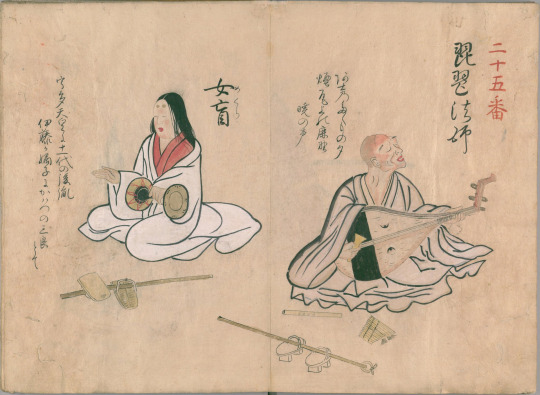
music that tells stories is something with a looong tradition in folk music, pretty much the world over. in Europe, the ballad was a common form for it, a word that survives into the present. it seems that most cultures have had some kind of tradition of wandering itinerant musician-poets - for example, at various points in history, there were biwa hōshi in Japan (pictured) and griots in West Africa, medieval Europeans had minstrels, the Celts had bards, the Occitans had troubadors...
moreover, work and marching songs such as sea shanties would also have a certain degree of narrative to them, in addition to their main function of keeping a group moving in time.
in modern times, people will sometimes attempt to reconstruct how this kind of music and lyric poetry would have been performed. you can naturally only go so far with the archaeological evidence, but I'm fond of Peter Pringle's recordings of segments of the Epic of Gilgamesh, using period instruments if not necessarily a period musical style!
in the modern age of recorded music, these traditions have become much more niche, but there are still artists who use music as a vehicle to tell a fictional narrative. (fair warning: I'm a huge nerd, so most of the examples I know are like, supreme nerd shit. also about ten years ago I was given an assortment of metal from a friend which included a bunch of what I'm about to put below.)


to begin with I've naturally got to talk about my friend Maki Yamazaki (Dr Carmilla) and the band she founded but later left, The Mechanisms. They tell a story of a sprawling gothic scifi universe, with the band playing the role of travelling space pirates who observe the (invariably tragic) tales that unfold. The Mechanisms' music starts as folk song pastiche, but gradually gets more original, although narratively they keep the approach of crossing over mythology with genre storytelling (fairy tales as space opera, arthuriana as space western).
The Mechanisms got a significant measure of international fame washing back after their frontman Johnny Sims got really big on some podcast or something.
Maki's solo music as Dr Carmilla took things in (from a narrative sense) a more abstract direction, using elaborate production and an incredibly textured sound to tell a (so far!) fragmentary story of the tragic space vampire Dr Carmilla and her doomed relationship with another vampire Lorelei (for example). And I'm gonna have lots more to say about them all, in the future, but this is just an overview so let's not get ahead of ourselves!
In a related vein (though I'm much less familiar with them) comes indie band Decemberists, who often create narratively driven songs - for example, The Mariner's Revenge Song depicts a sailor's motivation for extracting bloody revenge on someone who wronged him, with the actual violence conveyed by an energetic instrumental break. A subject that reminds me of the Clockwork Quartet, now long gone, who managed to record just three of their songs from a larger project, yet stand out as way more interesting than most of the steampunk milieu - with for example The Clockmaker's Apprentice giving a very fun antihero-revenge narrative to the ticking beat of a clock, and The Doctor's Wife a compelling tragedy of desperate medical science.


There's definitely something in common with this type of storytelling and the subgenre termed rock opera, which has a pretty long history going back to the late 60s (SF Sorrow by Pretty Things and The Story of Simon Simopath by Nirvana, thanks wikipedia), with notable examples including some incredibly popular albums like Pink Floyd's The Wall (which was adapted into a partly animated film using animations by Gerard Scarfe, c.f AN86) and My Chemical Romance's The Black Parade. In many of these, the connection between songs and narrative is fairly abstract and metaphorical - most of the examples mentioned are about the psychological arc of one character.
Calling this a genre or subgenre is kind of a stretch recently - just in those four examples we see a pretty wide range of musical styles, so it's more like an approach to album writing. Still, for want of a better word, there's definite overlap between this 'genre' and musicals. For example, the history on wikipedia cites The Rocky Horror Picture Show as an example of rock opera, which in my head it's just a musical. (Anyway, exactly the taxonomy of regular opera/libretto, rock opera and musical theatre is not that important anyway, because we want to look at the techniques of all of them!)


A more direct narrative comes in the work of The Protomen, who have the 'no way that would work' premise of creating a huge, dramatic, emotional story based on the plot of the Mega Man games. By putting the focus on the tense relationships of the fought main characters (scientists Light and Wily and robot boys Proto Man and Mega Man), and their sense of rejection and betrayal by the broader society, they somehow pull it off.
Moving gradually in the direction of (progressive) metal, we encounter Ayreon, whose entire career has been telling psychedelic and occult stories of time travel, aliens, warnings projected into the past, out of body experiences, and the history and direction of humanity. I'm not sure if all of their albums fit together into one big story exactly, but certain ideas seem to keep coming up - for example, future societies or aliens sending warnings to humanity to fix our shit before it's too late. In some of their albums (e.g. The Electric Castle) they follow the device of having each member of the band play a character in an ensemble cast, bringing it a bit closer to something like a radio play.
Also in metal land we find the rather unique project Charlemagne: By The Sword and the Cross, best known for that time Christopher Lee shed the blood of the saxon men. This is using music as a vehicle for a (more or less) historical story, featuring an old Charlemagne (Lee) reminiscing on the various awful things he did over the course of his life. Apparently they made a sequel to this album, which I never realised!
As well as history, metal also likes to lean on literature and poetry. For example, Kamelot (classed, apparently, as 'Power Metal') have a rather fun adaptation of the story of Faust into two albums, Epica and The Black Halo. Iron Maiden famously took on the Rime of the Ancient Mariner in a 13 minute song. And that's not even to get into all the songs dealing with Tolkien.


Moving on from metal before we start listing a hundred songs about vikings, it's worth looking more broadly for music about history, since it's a pretty major overlap with fictional storytelling! For example, the Boney M song Rasputin tells an incredibly catchy account of the assassination of Grigori Rasputin. Another rather more charged example comes in Nakam by Daniel Kahn and the Painted Bird, about the unsuccessful paramilitary plot to poison six million Germans as revenge for the Holocaust.
If you go looking, you can find an impressively long list of historical songs compiled by 30 users of lyrics website Genius - though many of these I feel don't really count, since they were describing contemporary events when they were written.
Of course, there is a heavy overlap between this subject and political songs - in many cases the historical subjects are invoked to comment on the present. For example, Wernher von Braun by Tom Lehrer was written at a time when von Braun was leading the US space programme. In many cases, the songs simply invoke a historical event to express a feeling, assuming you already know what happened. Others may recount events more or less directly, before seguing into a verse or two at the end about why it matters now. Most of the songs in this list focus on recent (20th-century) history, sometimes they reach further back - mostly to talk about colonialism.
Historical songs can also be quite oblique. For example, Mili's song Salt, Pepper, Birds and the Thought Police is about the life of Korean poet Yoon Dong-ju, but you wouldn't necessarily know it from the content of the lyrics unless you were already familiar with Yoon's life. More on Mili in a moment - most of their songs are more fictional.
One thing I'm curious about is whether there are examples of more historical fiction in music, which tries to imagine the thoughts and feelings of historical characters... well obviously there's Hamilton, and perhaps that illustrates why there aren't a lot more songs about non-recent history, because the vibes can be off.


Storytelling is still a powerful mechanism even in a contemporary, political song. Take Construção by Chico Buarque - the story it tells is of the pointless death of a construction worker; with the lines ingeniously remixed over the course of the song, this turns into a wider illustration of the ruthlessness of the system that killed him. Its lyrics are absolutely fucking genius, even if you don't speak Portugese.
Speaking of language, most of the examples I've covered so far are in English, since well, that's my native language. It's naturally a little harder to access a story in a language you don't speak, but in these days of subtitles, we kinda can! So for example I can encounter projects like MILGRAM, something of a combination of music project and voting-driven story, in which we are introduced (by character song) to a number of characters facing execution - and then invited to vote on who should die. Heavily illustrated, it is somewhere vaguely in the space between album and straight-up anime.
I mentioned Mili already, but many of their other songs have a strong narrative arc to them, and sketch out the contours of a fictional setting. For example, one of their best-known songs is world.execute(me), which portrays the failure of a bdsm relationship between an AI girl and her creator. Which is relatively grounded by Mili standards - other songs depict for example the relationship of a jiangshi and a mad scientist cooking food, or a witch reanimating a knight with scientific methods to kill on her behalf.
And I think that will suffice for now. But we are of course only scratching the surface - this is by no means supposed to be an exhaustive list but I'm sure there's stuff that I'll be kicking myself for not mentioning. Mostly, however, this is a request for recommendations - particularly, of music from genres I haven't addressed in this post, and especially non-English languages, or that convey their stories in especially creative or unusual ways.
This project will likely be a long time in the works - it's something of a supplement to the Music Theory Notes (for science bitches) series - but my aim will be to pick out a few of these to examine how they go about conveying narrative through songs. Because I think that's kind of one of the big things I want to do with music.
ok canmom out i gotta go play some music. see you next time!
#music notes#music#canmom vs music#the mechanisms#dr carmilla#the decemberists#the clockwork quartet#pretty things#nirvana#pink floyd#mcr#the protomen#ayreon#kamelot#iron maiden#christopher lee#boney m#daniel kahn#tom lehrer#mili#chico buarque#milgram#i think that's all the bands i mentioned in passing...
129 notes
·
View notes
Text

Guess who got excited and wrote a lot:
Much like on earth, regional language barriers still exist, only now it’s both within one species and between the different sophonts (you may know the Prectikar equivalent to English, but do you know their Greek? Etc) they all brought a lot of different languages and cultures with them before the crash and they’re still clashing and mixing to this day.
because of the physical difficulties in speaking each others languages the way they’re meant to be spoken (some don’t have lips) there are a few bridge languages purposefully designed to be easy to speak between sophonts. Most of them are sign (which still has its own problems because not everyone has the same number of fingers that can be moved in the same ways), but there’s also vocal bridges that are made of a mishmash of compatible sounds (the most common of which is called prime, taught in DRSS schools alongside whatever the dominant language in that state is.) Many people don’t learn other languages beyond what is necessary because of time and effort, and also the low likelihood of meeting a xeno who doesn’t already speak a bridge of some kind/ the expectation that a xeno you meet will *have* to know prime or something (kind of like Americans with English )
There’s also cybernetic translators/voice makers that can help, but based on price they can be rudimentary and usually limited to one or two languages because of the time it takes to sample and synthesize a whole alien language. These are most common among humans and Cerest !
Here’s some more individualized info based on the image:
Humans are by far the most likely to trip on a xenos cultural nuances because we literally just met these guys whereas they have been aware of each other/each other’s culture norms for much longer. Fortunately, humans are also a global superpower and so anyone in the DRSS and beyond kind of has to get with the program and act a bit more human if they want to be in our good graces. So for every human out there who’ll take the time to learn another xenos language and norms and try to meet in the middle, there’s three more who’ll just walk up, smiling, and put a phone in your face with a text-to-speech app open and a butchered version of a language you don’t even speak coming out the speaker. We also have the problem of treating all of them as if they’re the same when it comes to different xeno cultures
, since most info on them we know comes from sometimes not even the majority of their population but whatever group the Cerest interacted with first/the most.
Despite having the technological might, Rossetians put their culture and values in learning first. Thus, reliance on ai translators and the like is frowned upon (if they’re going to be communicating in a xeno language raw, then it’s going to be with sign, a manual noise maker or keyboard rather than an implant or phone). Thanks to their public politeness and avoidance of making a scene, they aren’t likely to vocally rebuke any slights in public, but may still show disdain and you *will* be added to a list of undesirables later. Most of their cultures follow their westerners lead in terms of clothing and social norms, so meeting a Rossetian who’s more aligned to say the East and treating them like a westerner can cause problems (ex. The west is fine with the human handshake, which is an analog for their own on version of a hand/tongue touch as greeting. The East doesn’t do this, and bringing your appendage that close to the hand of someone you just met is like proposing to a stranger since they associate hands/arms with marriage bonds. Just go with the tail touch oh wait you don’t have a tail). They’re also likely to see you as an alien first, person second, and are thus prone to weird probing questions and pushing of boundaries.
Kixeli can be overwhelming if you aren’t ready. They have the stereotype of being air-headed, super nice/friendly, positive and upbeat, and almost childlike, something that’s not helped by their high voices, permanent ‘smile’ on their face, or the way their cues just aren’t easy to read to the other xenos/the way they exaggerate their tone or movement to be more readable (most of their natural facial expressions are with the fin and tongue, something most other species have no precedent for how to interpret), Culturally they have a focus on community and the strong bonds within it, and though they are quick to anthropomorphize and see others as Kixeli ‘comrade’ , making a deeper connection with them takes more than most people realize. They can still be insular in their own way, and even if they’re being “overly” talkative, touchy, and friendly to a stranger in our eyes, they can definitely still see you as a stranger.
Thanks to historic exploitation and dehumanization (deprectikarization?) by other xenos, Prectikar have developed a culture around avoiding other cultures to protect their own. Tribe politics is an unknown landscape to most xenos, and often places will accidentally hire people from groups that hate each other and not even know until they start brawling outside the building. This can even be true between other Prectikar who, conversely, don’t have that strong of ties to a tribe/thier own culture because of xeno influence and therefore have difficulty interacting with their own kind (this is present in all xenos but most prevalent and obvious with them) Physically, they can have some trouble pronouncing words thanks to having no teeth or tongue in their main vocal cavity (the sounds produced by their throat’s air sac are usually inaudible and very limited) which feeds into the idea that they’re the big dumb guys, while their universally deep voices, minimal/ easy to misinterpret facial expressions, and size/strength make it easy for other xenos to see them as older than their years, unfeeling, and “perfectly fit” for prolonged hard labor. Humans tend to see them as the big scary ones and avoid them in turn, and usually associate them with heavy laborers or military if they think about them at all. Cerest and Rossetians have a history of dismissing or bastardizing their culture because they’re a ‘lower’ species alongside the Kixeli. Kixeli view them as hard to reach but not impossible to befriend, something that Prectikar also mirror towards them, thanks to their shared position as the lowest class of xeno in the old and new Empire (but they can still hold those stereotypes about each other)
Cerest, unsurprisingly, are the hardest to socialize with. Humans have a lot of poor associations with them thanks to the war and also a lot of misinformation is spread about them and taken as fact (example, a lot of humans actually think that Cerest can speak almost telepathically and have a hive mind, because bugs, where they actually just communicate in non-vocal ways most of the time and have a pseudo eusocial structure. Fun fact, the ‘telepathic speech’ ability actually belongs to muttreazik, who use their worm brain to emit high frequency waves and beam them directly into each others head as ‘words’. ) Everything we know for sure about them that is uncomfortable to us is blown out of proportion, such as their child rearing standards. Yeah they have less taboo around culling their eggs and higher infant aggression than any other species, but this doesn’t mean that separating Cerest children from their unit isn’t traumatic and it doesn’t mean that they hate their own (like the government would like you to believe so that their internment camp-I mean enclave practices don’t look as bad). The only reason Cerest can make noises is a side effect of them developing lungs. It helped them communicate longer distances and emit distress calls, but is largely hard to control for them and not used that much in any of their languages. Without extensive voice training or a translator, they sound like they’re buzzing at you, which can make talking to them difficult if you only know a vocal bridge. Cerest are such a minority in the DRSS, with most units living in designated and monitored Enclaves, that no one really has the best idea of how to interact with them. When they do, you’re usually hit over the head with how cold, disdainful, and lofty they can be thanks to their cultural conditioning to see other xenos as non-people. You’re pushing them away simply by being another species. But, even if the Cerest you’re speaking to doesn’t share those ideas, literally everyone characterizes them as unfeeling robotic hateful and callous , pretty much dehumanizing them right back (deceresting???????) and pushing them away from your side. It’s a lose lose situation all the time for everyone involved.
Just now realizing that I didn’t include muttreazik. Uhhhh. Based on their resemblance to their host they either follow these rules/have the same problems or get extra problems from looking so different.
The end :)
38 notes
·
View notes
Note
i know its been 7 years but im honestly so invested in the zuko aang swap au, how was avatar zuko before entering the ice? who was the avatar before him? is he disgraced brother to firelord azulon? how does azula feel about trying to kill her own great uncle?
okay here's what i have for avatar zuko's backstory...!
i'm mucking around in timelines because the avatar Zuko fics i saw before had several avatars die in quick succession to go from Roku -> Zuko which never made a lot of sense to me. instead we're just going straight from Kyoshi to Zuko. she can live a couple extra decades, she's already like 200.
it also doesn't make sense to me to have Zuko be royalty, because that seems like a MAJOR conflict of interest for someone who's literally born to balance global politics, which whatever mystical force decides the next avatar would want to avoid! (that's not even getting into the possibility of an avatar becoming head of state. yikes.) so instead i'm giving him Roku's backstory to make him a close friend of a fire nation royal, in this case prince Azulon since i want him to be a little older than Aang when he's frozen in ice.
Roku in this universe is actually Zuko's father. he's a close friend and ally of Sozin, which is why Zuko is a playmate of his from a young age. i think i have him as a naval officer for plot reasons.
Zuko's mother on the other hand is a complete oc! her name is Hoa Sen, and she's a complete badass. she's not a bender, but she is a legendary swordsmaster who in her youth once sparred with Avatar Kyoshi and forced her to use all four elements before Kyoshi finally defeated her. this is the reason Zuko knows swords and bending; no son of Hoa Sen is going to grow up without a sword in his hand 😤
Hoa Sen is actually kind of estranged from her husband due to a major disagreement about his current political career. she lives in a house on ember island.
he also has a little sister. since roku's wife here is an oc i'm gonna steal his og wife's name, so she's Ta Minh. she's not a bender. she and Zuko were close as children, but grew apart since she lives with their mom. we'll get back to her later.
Zuko's animal guide is a dragon named Druk, as per Zuko's canon dragon. he is not particularly bright and likes to cause problems on purpose. every plot line from the original show that happens because Aang is lost or wants to ride giant animals is replaced with Druk deciding this is the perfect time to Cause Problems On Purpose.
Azulon is Zuko's oldest friend. i think Azulon has other friends and while Zuko is in their group he's not particularly close to them thanks to his whole [gestures at canon Zuko]. you know. the autism. so they're still very close.
i think also the REASON Zuko was chosen as a childhood playmate for Azulon is because Sozin found out Zuko was the new avatar and was trying to indoctrinate him into being loyal to the fire nation over all else.
(which is also the reason he has a dragon and azulon doesn't.)
this does NOT work btw. Sozin reveals to Zuko that he's the avatar early and demands his fealty, which Zuko refuses because he's a good kid. and then he gets his face burned off. Sozin doesn't kill him because it would just make his life harder, but tells Zuko that it's out of respect for his father. so he's just banished instead.
before Zuko leaves Azulon visits, says he'll be welcome back when Azulon is fire lord, and gives Zuko the crown prince's headpiece, which zuko wears even in the present!
Hoa Sen has old friends of her take him first to the Western air temple where he can heal, and then to the Southern Air Temple to start his training.
i think the monks actually refuse to teach him for a long time because Zuko has some serious issued to work through and they think he needs time to heal mentally and emotionally before he's ready to start taking on his duties as avatar. eventually the ominous prophecy rears its head so he does learn some stuff.
Zuko gets frozen in the iceberg because he knows something bad is going to happen and is frustrated with his training being stalled, so he decides to just skip air and go straight to water.
Here are some fun facts that Zuko does NOT know at the start of this au but do become tragically relevant to him.
Hoa Sen founded the order of the white lotus after seeing what Sozin did to her son, originally as a way to protect him during his training and then to mitigate the damage the fire nation was doing without an avatar to stop them. not sure if her family knew about it, but they did know she objected to Sozin's war.
Azulon married Ta Minh, I think to protect her and her family out of memory to his friend, but also because it's good optics to be tied to the missing fire nation avatar. it's not a particularly happy marriage, but it is functional.
(Zuko does not fucking take this well btw.)
Ta Minh became well known as a swordmaster and actually took Piandao as an apprentice. Iroh and Ozai had no interest in swordplay, so she never bothered teaching them. Lu Ten did express a bit of interest, and ended up learning a respectable amount before she died.
Azula inherited her grandmother's face. Zuko is (understandably) very upset about this on a cosmic level.
Iroh knows all of this and does not tell Zuko until he is forced to in season 2 after azula becomes very relevant.
Azula is also being mentored by Iroh's ex-wife, because #whereareyourwomenbryke and also i think he deserves this.
42 notes
·
View notes
Note
Albert Camus could not conceive of Algerian independence, nor could he conceive of himself as separate from French Algeria. It was his “red line in the sand,” the boundary which should not be crossed, the ultimate taboo. Algeria was the jewel in France’s colonial empire, so important that the French authorities considered it a region of France. It was not just a military conquest; it was an administrative one as well. Camus was defined and defined himself by colonial Algeria and could not live without it. Yet the paradox is that Camus persuasively uses the rhetoric of humanism while supporting French sovereignty over Algeria. Many of Albert Camus’ arguments are vastly identical to those trotted out today regarding Palestine.
“What is illegitimate in Arab demands ? The desire to regain a life of dignity and freedom, the total loss of confidence in any political solution backed by France, and the romanticism of some very young and politically unsophisticated insurgents have led certain Algerian fighters and their leaders to demand national independence. No matter how favourable one is to Arab demands, it must be recognized that to demand national independence for Algeria is a purely emotional response to the situation. There has never been an Algerian nation. The Jews, Turks, Greeks, Italians and Berbers all have a claim to lead this virtual nation. At the moment, the Arabs themselves are not the only constituent of that nation. In particular, the French population is large enough [c. 1/9], and it has been settled long enough [c. 150 years], to create a problem that has no historical precedent. The French of Algeria are themselves an indigenous population in the full sense of the word. Furthermore, a purely Arab Algeria would not be able to achieve economic independence, without which political independence is not real. French efforts in Algeria, however inadequate, have been sufficient that no other power is prepared to assume responsibility for the country at the present time.” — Algerian Chronicles
Camus is like the “Israeli left” and a part of the Western Left in general who cannot conceive the total liberation of Palestine. That’s why I said that if they actually cared they would have more “porteurs de valises” and less Albert Camus.
The porteurs de valises who were settlers totally conceived a free Algeria in their mind and they saw themselves living there as ALGERIANS and they did. They also acknowledged that as settlers they had bias and they worked on those bias (I made a post with the testimony of on of those men and how he realized that he had racist bias against Arabs and how he eventually realized that even if he was white his people were not French people but Algerians…) Most of those settlers who fought alongside our grandparents did not leave because they were kicked out at the independence. They left as refugees during the Black decade and had to fill the SAME paperwork as other Algerians. (I could talk about the 121’s Manifest but given that some of the people who signed it turned around and became Zionists I think the manifest was more about white people wanting a clear conscience they did put the right to not be an oppressor on the same level as the right to not be oppressed)
Camus on the other hand was racist he was a product of settler colonialism. You cannot steal, dispossess, oppress a people for over a century unless you don’t see them as fully human. He kept equating the resistance with the oppressor he kept pretending to condemn violence on “both sides” but when he was asked to sign the letter condemning the systematic use of torture by France against Algerians he refused to sign it. He also kept implying Algeria didn’t exist before France anyway. He also showed his lack of knowledge on history by claiming everyone had a right to Algeria anyway not just “Arabs” because Algeria had been part of the Roman Empire and the Ottoman Empire. Jews as a whole have zero rights over Algeria. Imazighen Jews had a right over Algeria because they were Imazighen not because they were Jews. If Turks, Italian, Greeks had a right over Algeria then we have a right over the south of France, over Spain, over Sicily, over Greece because some Roman leaders were Imazighen and because Al Andalus existed.
But what’s maybe one of my biggest issue with Camus, probably because that’s still happening to these days. Is how his position would require only Algerians to compromise. Settlers were simply asked to stop the killing and to pretend to see Algerians as equal humans that’s not a fucking compromise. Algerians on the other hand were asked to pretend that nothing had happened? Those white settlers who had killed your sons and nephews on May 8th 1945 in Setif and around? They never got punished for it. They never even expressed regrets they were proud of it. Algerians were asked to just forget about it to pretend it never happened. The guy who stole your father’s land and is making money from that land? In Camus’ Algeria he gets to keep that land in exchange he must pretend Algerians are equal. The Algerian has to pretend that land was never stolen that he doesn’t have a right to it. In Camus’ vision for Algeria only the Algerian is asked to actually make compromise so the white man gets to be cleaned of his sins.
To these days in the West, PoC are the one asked to make compromises all the fucking time (sometimes on a smaller scale sometimes not). “vote for the lesser of two evils it will be easier to fight and we will help”. Once the lesser of two evils is elected the people who told us to compromise don’t respect their part of the deal they actually call us out when we protest. Because those “deals” are not meant to save us all they are meant to save white people. Because the lesser of two evils doesn’t affect them and their lives so they will be able to afford staying comfortably at home and criticize us for still fighting.
That’s why what I resent the most about Camus is that “let’s make a compromise” attitude that actually only requires compromises from Algerians while settlers get to keep up with their lives the same exact way except they have to pretend they see us as humans. I would believe in the genuine intent behind these compromises (while still being against it) if reparation was mentioned for example but no, settlers get to live the exact same way as they did before they just get absolved of their crimes without ever getting justice. Meanwhile Algerians are asked to pretend nothing happened.
Just like I previously said that a settler colony cannot create settlers without racist bias and that they need to work on those bias, a settler colony also cannot create indigenous people who are not oppressed. Every single Algerian family has a fucked up story to tell about the horror of colonialism. Every single Palestinian family has a fucked up story to tell about the horror of colonialism. Every single Native of Turtle Island family has a fucked up story to tell about the horror of colonialism. I could go on, the point is you can’t ask people to just pretend it never happened because now the settlers are pretending to see you as a human.
#Albert Camus#settler colonialism#algeria#French racism#settler colonialism lead to genocide#racism#indigenous rights#ask
192 notes
·
View notes
Note
do you support a one or two state solution? what is the difference between the two?
The one-state solution generally advocates merging Israel, the West Bank, and the Gaza Strip into a single state. Some favour creating a single democratic country, where Arab Muslims would outnumber Jews, thus ending the Zionist project of Israel as a Jewish state. The other version involves Israel annexing the West Bank and either forcing out Palestinians, annihilating them or just denying them the right to vote or take part in civic life. A two-state solution is advocating that Israelis and Palestinians both have their own independent state, though the variations between different approaches on this one tend to be much wider. People argue over what the political arrangement would look like, where each state would end, UN membership etc.
I think that the ideal scenario would be a one state solution where Israelis and Palestinians were both represented, under a fair democracy, with wealth redistributed and displaced Palestinians return home. The problem is that with things as they are now, because of the western support, wealth and military power Israel enjoys, practically speaking, the ‘one state’ would be Israel. Israel would likely keep its existing power structures and prejudices, Palestinians would be second class citizens, poor, very likely oppressed and with minimal representation.
For that reason, I’ve always advocated for a two-state solution under the terms of a return to something resembling armistice lines that were agreed at the end of the 1948 Arab-Israeli War. I’d also want to see the return of Resolution 94, which stated that Palestinian refugees who wish to return to their homes should be allowed to do so. Israel would also need to fund the rebuilding of a prosperous Palestinian state.
I'll admit though, it is difficult to see how this could be agreed in practice. With Israel committing genocide in the region, they will create a whole new generation of terrorists, freedom fighters, and militants of all political stripes, who have been radicalised, orphaned, disenfranchised or displaced by the genocide. The IOF have all but ensured another century of conflict, even if the West does decide to withdraw their support of the genocide.
I really don't know what the right answer is, I just know that an immediate and permanent ceasefire, is required to even begin to figure it out. Which ever 'solution' you advocate for, any reasonable person will agree that there can never be an end to the conflict while Israel continues to torture, displace, execute and starve the Palestinian people. And not until the West stops supplying the IOF with arms and political support, either.
65 notes
·
View notes
Text
A little bit of mumbling about the Full Moon episode and Stolitz drama
ALERT: multiple Helluva Boss spoilers, so, please, be advised
Yea, it's another episode of "I can't get over relationship issues of a red lizard and a tall owl", so buckle up, and let me give my share of thoughts about how important was what we have seen in the "Full Moon" episode.
I appeciate if you read it, because it's quite big and I realise, that not much people like longreads, but I desperately wanted it out, and I wanted to try to engage with HB community, as I saw so many wonderful points, analysis, and observations out here.
So... let's go, I guess!
The Growth Concept
Once, my therapist told me, that sometimes, the only way to grow and do better is to face a challenge you cannot avoid anymore, albeit desperately would want to. We do not grow, when everything is convenient and stable, no matter whether "stable" means stability or stalling. We grow, when life pushes us to do so, when we have nowhere to run anymore. When there is... when there is just no other way.
The Full Moon meeting, albeit infinitely sad and hurting, was the challenge for them to become the better versions of themselves. Stolas caused the rumbling, something you cannot take back anymore, something which couldn't be returned to status quo. It was very brave of him to do so, to give the chance to be open and vulnerable for a change.
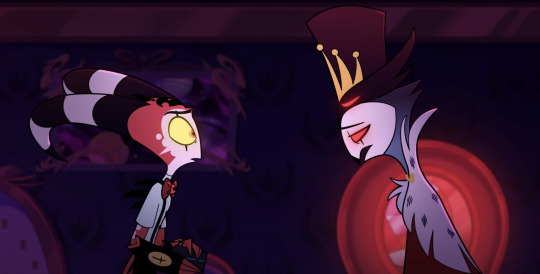
"It's... we're not... it's not a... It's a transactional fucking, you see" - S1EP5. As you may witness here, in S2EP8, exhibit A is clearly not happy with the transactional deal ending in his favor
But could it be better than that?
Even before the episode came out, I don't think anyone had expectations for the meeting to not turn out ugly. Trailer already hinted at that, and, besides, their earlier interactions gave nothing of "let's communicate" vibe.
Stolas was not clear about wanting to talk their issues out, the viewer was the only one who knew he longs for that. Yes, you may say that Stolas *suggested* to discuss what happened at Ozzie's, as we have seen at the end of the "Western Energy" episode, but immediately retreated after, I am sorry, a simple question "why?". It does not mean "no", yet, Stolas instantly gave up and fell into one-side poor explanation of what he thinks happened, not giving Blitzø space to engage.
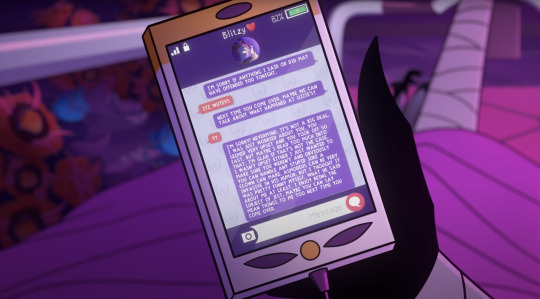
People also like to mention Blitzø's one-liners of an answer, implying him not wanting to do anything with Stolas, but I want to point out how Stolas himself bolted out of every opportunity to meet. Blitzø never said "no" clearly, and still Stolas cut every opportunity out.
Notice also how Stolas's messages are much more complicated and over-explaining, while Blitzø's are extra short and on point. I think it also shows in how different environments they were raised in, with Stolas knowing royal etiquitte, where everything is a sub-text, intrigue, rules, and no one is quite clear on intentions, and Blitzø not giving second thought about what leaves his mouth, or, in the case of messages, textbox. It's not only in their ability to simply write grammatically accurate, it's in their style of communication, culture even, where the problems of Stolas is to play the politics, and Blitzø's problem is to simply stay on float for another day.
And Blitzø? Hell, my poor man is deaf, blind, mute, and emotionally illiterate. It took Fizz 40 seconds to crack the case open in the "Oops" episode, and Blitzø didn't even pick up on it, despite being said twice he is wrong about Stolas. He would never come to *that* conclusion himself, even if the whole show cast will scream "STOLAS LOVES YOU" in his face. How can you expect him to even try to comprehend hints in behaviour and messages? And don't be fooled by his "it's only transactional, you see" moments - when he never says he is into Stolas, the show gave us plenty material to doubt that statement. He averts his gaze, saying "it's only a deal", hence he lies. He blushes when seeing Stolas's human form, hence he likes him. He is offended and hurt by Ozzie's accident, hence he cares. He crawls himself on knees and is not bothered by chains, hence he wants to belong to Stolas. He doesn't voice his desires once, but you know they are there.
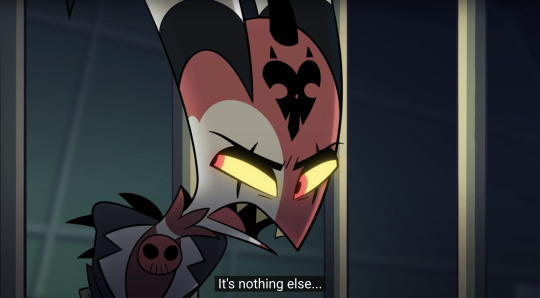
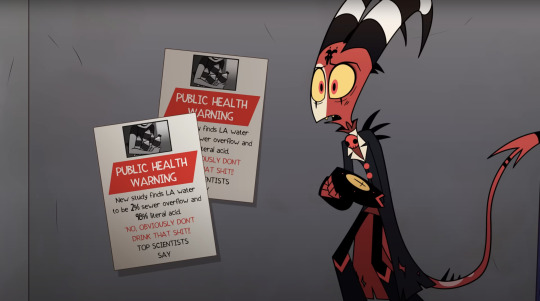
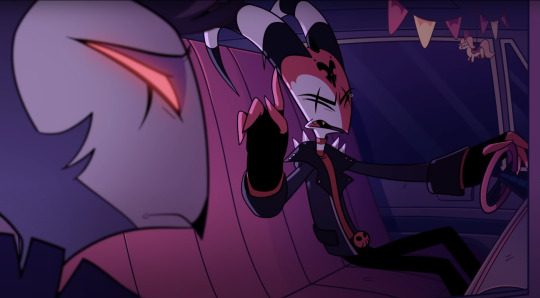
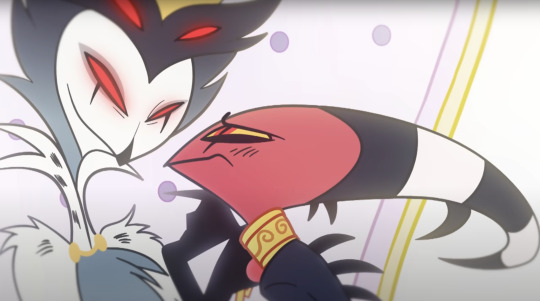
So, no, before that night, they had no chance of getting better, because they were too deep in their own trauma and world view. I want to make that clear, just in case if someone still wishes it went better.
And that leads us to the Full Moon, where all cards were out
There is plenty of analysis already all over the Internet on every frame of the show, how beautifully it's written, and how masterfully it was performed, when you can see so much in each tail flinch, each face expression, each movement, and each word. I won't go into that, I think I would be rather repeating things said so many times by so many observant fans.
What I want to add, though, is... The fail was unavoidable, but necessary. It was not preventable because of many things, also explained many times... But, shortly, just to carry on the point, you cannot undo years of trauma, self-hatred, and abandoment issues in one night. You cannot revert all of the mess they already created with the whole deal thing.
But you can face the issue. You can stand up to it. You can break the wrong and to try to rebuild to do it right.
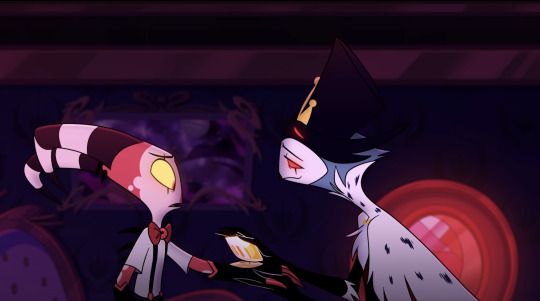
And that's what Stolas did. He stood up not only to his fears, but also to Blitzø's, and his desperate attempts to retain status quo.
Stolas challenged both of them.
And a small note: another thing which went wrong is how much of a shock it came out to Blitzø. Stolas was ready to face the challenge, because he couldn't take it anymore, he planned that night for weeks. Blitzø was not ready for that at all, but Stolas pushed him to the point of no return, and Blitzø was forced to adapt to the new reality in seconds.
Their reactions make so much sense. While Stolas was ready, there is a difference between being ready to face it, and being capable of facing it gracefully, and Blitzø... well, he didn't even have a minute to internalize all what's going on, and Stolas being for once extremely clear in intentions didn't help, because trigger already kicked in.
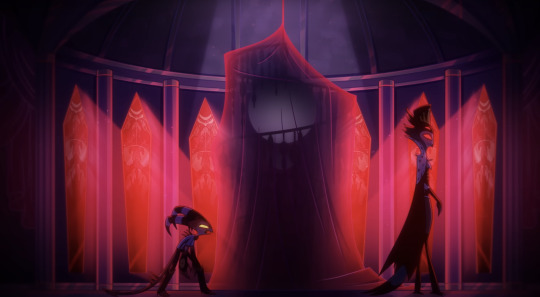
But is it that bad, really?
No, I don't think so. In fact, that fight they had was even good for them.
As tragic as it was, they got something out of it. Now there is no space for doubts about them having feelings for each other. Sure, they might be adamant about other wrong assumptions, that their partner now hates them and they are trash of a hellbeing, or whatever else they heard instead of what's actually been said, but, again, there is no doubt it's fucking serious. They cannot pretend or hide anymore that this is "just a deal".
That exchange opened the space for them to grow. Despite me feeling like I was stabbed after watching the episode, I am... even glad it turned out this way, because now, when all the words are said, all crutches broken, old wounds are opened and actively bleeding, there is a chance for them to heal, and to learn how to walk, not allowing their trauma to shape who they seem to be and inhibit their real selves.

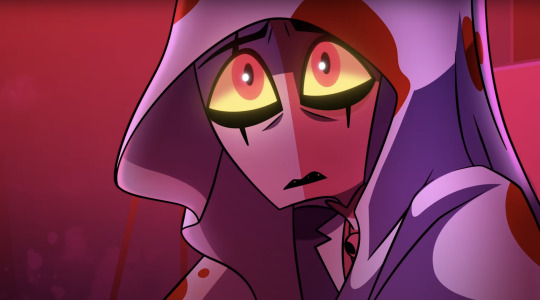
There is now hope for them. You can clearly see them being vulnerable in the last trailer, and being together, on one couch, at least... one can only hope that they will have the capacity of having just one more proper talk.
Thanks for coming to my ted talk, I know I speak too much, and no, I am not okay, but I hope it was at least a bit entertaining for you :d Also, English is not my first language, soooo... cut me some slack with grammar and consistency, please, haha
Happy to carry on the great mission of overanalyzing every bit of information we have about them XD
#here i am hyperfixating again#overanalyzing shit and never having enough#helluva boss#stolitz#stolas#blitzø#vivziepop#stolas x blitz#blitzo#full moon
57 notes
·
View notes
Text

Like most of the post-Dini DC cartoons, this falls pretty flat. It's basically a trilogy of Elseworlds stories, showing the Trinity (plus or minus) in various AUs before they break free of their mind-whammying, figure out what's going on, and fight back.
Wonder Woman in a Western pastiche that bewilderingly features Jonah Hex as the main villain. I know DC doesn't have a lot of particularly memorable Western characters, but the whole subversion of Hex is that, for as brutal and ugly as he is, he's a hero. Making him a villain just turns the character into a massive cliche.
This one suffers from Wondy being so powerful that she just wasn't really work in a Western setting. She's bulletproof and superstrong--why does she NEED to shoot people in the head? Isn't that ridiculously violent for her? The means by which she resolves the conflict is also pretty silly--I know she doesn't have the Wisdom of Solomon, but I thought Diana had some brains. Oh well.
2. Batman as a Conan-like mercenary in a pretty faithful rendition of Skartaris
Like I said, this take on the Warlord is shockingly accurate to the comics, down to the skimpy costumes on men and women alike, and some deep cuts like Machiste and Mariah.

A bit above the call of duty, since my expectations would be Jimmy Olsen in a fur bikini or something equally nonsensical. This one's fun on the level of a Primal episode, but it suffers from Batman being completely subsumed in this amoral Conan characterization.
Surely, the point of these Elseworlds is to see our recognizable characters in other circumstances. But this barbarian Bruce is a completely dishonorable asshole. He's apparently motivated by sheer hedonism--does that describe any Batman, even Adam West? I would've sooner believed he's driven to be the best or that he wants to master fear, but we don't get any character notes along those lines.
3. Lastly, there's Clark Kent in a fifties sci-fi B-movie sort of set-up. As with any appearance of the Fifies in genre storytelling, it's about how regressive and paranoid Americans were and how they want to persecute everyone that's different from them. (Weirdly, this is restricted to "unamerican foreigners," not the black man in the ensemble--is this some odd version of politically correct history where African-Americans, who were totally accepted, got in on rejecting outsiders?).
Anyway, Clark figures out there's something wrong with this picture and he manages to break free along with Diana and Bruce, leading to them finally confronting Mongul. It all goes into a pretty rushed and unsatisfactory ending leading into Crisis on Infinite Earths, involving a well-known heroic figure acting outrageously callous and none of the Trinity being able to stop him and enact a more merciful solution to the problem at hand. Blargh.
15 notes
·
View notes
Text
Alex Garland's Civil War is my perfect movie. I'm not sure who else's, though.

There's a thing I've said about lots of art: if you have to read the artist's statement to get the point, the artist's statement is the art. I read multiple interviews with Garland, went in prepared for the movie he was trying to make, and I loved it, a lot. I don't know if I can say that I enjoyed it, because it's super-emotional, especially super-tense. But I'm very very glad I saw it, and if somebody invited me to go with them, I'd probably watch it again, and I may well buy the blu-ray when it comes out. That being said? I'm not sure who else, other than a few weirdos like me and a few academic cinephiles this movie is for.
Remember the movie Pleasantville, if you even saw it? The trailer mislead a lot of people into expecting a jokey comedy about how dumb "Return to Normalcy" era sitcoms were, and nearly everybody who went in with those expectations hated Pleasantville, because what they got was a deep philosophical meditation on how you can't actually solve a social problem without losing your innocence, and loss of innocence, no matter how necessary, hurts. So almost nobody loved Pleasantville but a few people like me, who wanted it injected straight into our veins.
So let me lay this straight out before you buy your ticket to Civil War:
First of all, at no point in Garland's Civil War do they tell you the politics of any of the three sides in the near-future second American Civil War. Nor are you expected to figure them out. The war started four or five years before the first scene of the movie, and none of the people in this movie are still interested in debating why the war. There are three sides, and while there are people who say that the Western Forces are Democrats and the Florida Alliance are Republicans and the Federal Army are Trumpist, they are reading their own prejudices into way too few background clues and ignoring the other background clues that contradict that theory.
I know that every American who sees this movie is watching to find out which army is "on my side," which one they're supposed to be rooting for, and that is not a movie that Alex Garland wanted to make. You are supposed to be rooting for the war to just be over and elections to resume. Because that's what every civilian and every soldier wants, and nearly all the unlawful combatants. And also ...
This is not a war movie. If you want the (somehow, to you anyway) relaxing catharsis of cheering while lots of military hardware gets used? You are going to hate Civil War because this movie is, to borrow an older metaphor, Tomorrowland to your Mad Max: Glory Road. Garland made this movie to shame you particularly if you like war movies. The total amount of combat footage in this movie probably doesn't reach 20 minutes, and our main viewpoint character for the final battle sequence is a traumatized civilian.
One last thing I can say before diving behind a spoiler warning, though: it is an amazing technical movie, this thing should win all the technical Oscars next year. In particular, the principal photography is the best I've ever seen and the way it mixes (and sometimes un-mixes!) the separate audio tracks perfectly manipulates the tension level. And all four lead actors put their whole selves into these parts and held nothing back.
So what is this movie if it's not a political movie or a war movie? I can't tell you that without diving at least partway into spoiler territory, so ...
Alex Garland wants to prove two things in this movie:
Life in a failed state sucks ass. Yes, even if you're nowhere near the combat zone. And ...
War correspondents and combat photographers themselves wonder if what they're doing is making any difference, but they're heroes for trying.
The journalists themselves can't point to a single time what they do prevented or stopped a war, and they very much wonder if they're just adrenaline-addicted glory-hogs. But even not even knowing if what they're doing will ever save a single life, they are absolute fucking heroes. They put themselves at insane risk because this is the only thing that they know how to do and if it has any chance of saving lives, of preventing or stopping war, it has to be tried.
Our main cast are four journalists: an elderly war correspondent, a middle aged war correspondent, a middle aged combat photographer, and a (too) young combat photographer on a mission:
They start in Federally occupied NYC, reporting on anti-regime protests and terrorist attacks. They've heard rumors about the actual war. Right now the front line is a three-way battle for control of Charleston, South Carolina. They've heard that the Westerners and the Floridians are going to fight each other to the death as soon as they push the Federals out of the Carolinas, and then on July 4th, just a week away or so, the likely winners, the Westerners, are nearly certain to seize the capitol. They think the 5 year war is almost over, and are trying to figure out how to cover the end. This is, like, literally the whole of the first two scenes.
The old guy wants to cover the battle of Charleston "for whatever is left of the New York Times" and then retire. The three younger journalists have an even crazier idea: skip the battle of Charleston and use the last remaining highway into/out of DC to outrun the Western Forces and cover the fall of the White House.
So the overwhelming majority of the movie is a several day, many hundred mile road trip in an armored car marked PRESS. This involves driving west to Pittsburgh and then back east to Charleston, to get around the combat zone, which results in the real main part of the movie:
The road trip is intended to show you how much the combination of anarchy, localized paranoia, and fear of looters is driving various levels of savagery far from the war zone, which the reporters and photographers keep stopping to document.
It ends with the race to keep up with the Western forces so they can cover the fall of the White House, which is the only long combat scene in the movie, and it is incredibly intense, and very loud and scary, and nobody except maybe the kid photographer covers themselves in glory.
And every scene of it tells the same didactic message, told in about a dozen different ways: when the war is over, whether or not you were "on the right side" is going to matter a lot less than the horror you lived through, and wartime journalists put themselves through hell to try to prove that to you before it's too late.
57 notes
·
View notes
Note
I genuinely confused about the whole drama fuss is all about. All fandom always at least have that one toxic ship, it's inevitable. And master/slave trope is not a new concept either, heck people seems fine about the trope as long as two party are attractive i suppose (shrug).
Plus dead dove do not eat also is a thing. It's unavoidable, if someone really didn't like a content there's literally a mute or filter
TLDR: It was always gonna go this way.
The long version: people originally started arguing about Caesar/Arcade because bickering over how to write characters’ romantic lives is time honored fandom tradition. This has been happening since the days of Star Trek and Harry Potter, it’s nothing new. These scuffles become especially aggro & self-serious when related back to a popular blorbo - those (usually male, almost always white) characters that are kinned, stanned and projected onto moreso than others. Arcade is absolutely that guy, right? He's a lot of people's favorite. He's special.
This spat featured casual racism, offensive name-calling and some brazen, truly nonsensical appropriations of AAVE, because those are also time honored fandom traditions. (Even if you niggas are cagey about acknowledging that.) Art in western culture is heavily influenced by white supremacy, and fandom, including the FNV fandom, is just one niche within that culture. White people, especially the young n cool™ ones, value their position as consumers & beneficiaries of black culture more than they value black people. They are known for selecting parts of our identity, language music clothes hairstyles etc, removing them from the original context, and bastardizing them so they can be used as a cultural commodity for nonblacks. Something that is put on and taken off for funsies, cosplay style. That FD Signifier video I was hyping up over the summer had a whole section about this. He also just released a new video on black cops which is worth checking out.
Now, tumblr's userbase generally believe themselves to be more enlightened than fandoms as you see them on reddit and twitter. And this is true, on a superficial level; you are much more likely to be met with slurs and open hostility on those sites than on this one. I also believe that, because the demographics which form the majority of tumblr's userbase - white gays and white women - have traditionally been marginalized & subjected to mistreatment within mainstream pop culture, they are especially resistant to identifying and dealing with the ways in which they fall short of their own progressive ideals. No one wants to see themself in the same light as their own bullies.
The problem is that, when it comes to their behavior, tumblr's FNV fandom can be pretty damn regressive, especially on the topic of race. They tend to have an excellent grasp on liberal terminology and identity politics, so they are comparatively much better at keeping these misgivings covert. But in practice, you will find them to be no less self-centered, entitled and anti-black than the FNV fanboys you would expect to find on reddit and twitter. I got into this game right around the time it was revealed that some white users were producing extreme anti-native content behind closed doors, an experience which has fostered an increased sense of isolation and paranoia among the remaining people of color in the community, as far as I can tell.

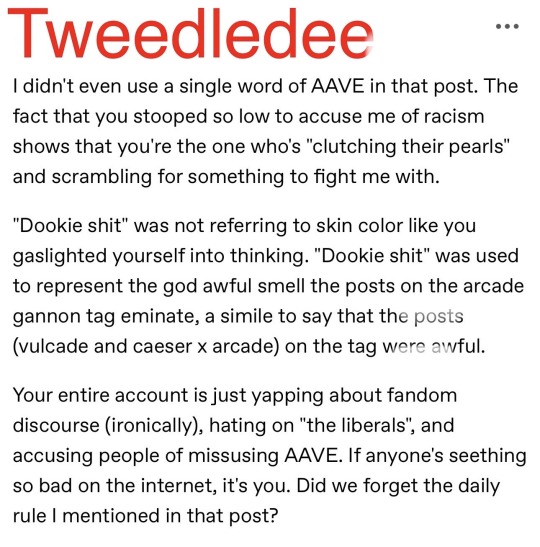

Okay, so, some white users start doing the ~Oooh Chile You'sa Lame Ass Homeskillet~ routine characteristic of digital blackface. They go out of their way to be as disrespectful and verbally abusive as they can in the process, because atp they're still on the offensive. And they misuse the black words they're "borrowing" because they don't know what they actually mean. When myself and a few others respond in kind, they double down, carrying on with the nastiness and the bizarrely racialized talking points. (Unironically calling people you don't like "degenerates??" Really?? School failed some of y'all smh)
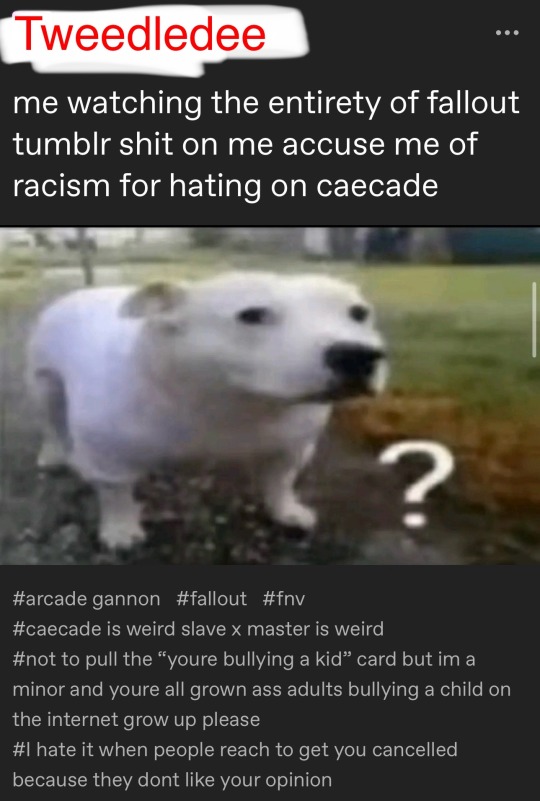


A couple days go by and, instead of moving on and finding something else to do, they press the proverbial self-destruct button and engage in civility politics. The malignant tone of the original posts is abandoned, and instead, the people who once adopted it become… shocked and confused and wounded. They start talking about how, instead of matching their energy, their contemporaries should've just been "nice" and "civilized." They start complaining about being “canceled” just for having “opinions,” going back and forth between making half-assed apologies and insisting that the original issue wasn’t that big of a deal because they didn’t have “the intention of being racist” as if “having the intention of being racist” is something people ever do.
You would never guess that 1.these were the people all but outright referring to their peers as unwashed subhumans not last week, or 2. that they did so while identifying as left wing. Because rhetoric like this is borne from a place of privilege. Expecting that no one you’re denigrating will be allowed to meet you with an equal level of vitriol, because your space considers doing so to be taboo, is the kind of behavior that arises from too long spent insulated from the nonwhites who created the language they were mimicking. Nonwhites who might take umbrage with their broken attempts to use it while in the same breath calling them & theirs a bitch.
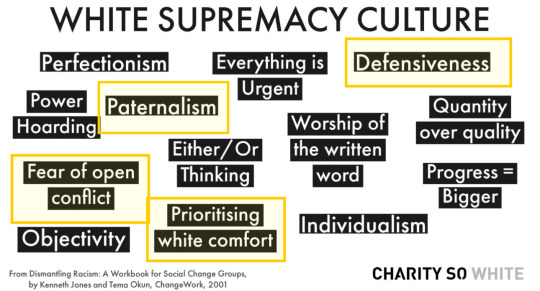
And if theres anything I would like people to take away from this, it's that the parts of fandom culture which they might have expected to have evolved in the past decade or so have, by and large, not evolved. Even some predominantly queer spaces will readily adopt the talking points of the right wing and prove themselves to be every bit as hostile to poc if you don't abide by their rules and center their perspective. So you should think before you speak and make an effort to not throw rocks and hide your hands, as is the parlance of our time.
Lastly, please do not go find these people and bother them on my behalf. I'm gonna take the poor english language comprehension between the both of them to indicate that they’re probably all, if not minors, young adults, which means they’ll likely learn not to act like this on their own. Or not! Maybe they'll be like this forever. Maybe one day I’ll see their names in the news after getting their shit rocked for saying a slur on campus & crying to the press about how they’re the real victims here. I can't influence whether or not that happens, because I’m not their counselor or their mom, even if they expect me to act like it.
18 notes
·
View notes
Text
2024 Book Review #27 – From the Ruins of Empire: The Revolt Against the West and the Remaking of Asia by Pankaj Mishra
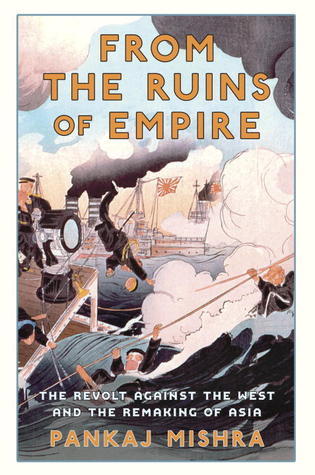
Yet another work of nonfiction I picked up because an intriguing-sounding quote from it went viral on tumblr. This was the fifth history book I’ve read this year, but the first that tries very consciously to be an intellectual history. Both an interesting and a frustrating read – my overall opinion went back and forth a few times both as I read and as I put together this review.
The book is ostensibly a history of Asia’s intellectual response to European empire’s sudden military and economic superiority and political imperialism in the 19th and 20th centuries, though it’s focus and sympathy is overwhelmingly with what it calls ‘middle ground’ responses (i.e. neither reactionary traditionalism nor unthinking westernization). It structures this as basically a series of biographies of notable intellectual figures from the Islamic World, China and India from throughout the mid-late 19th and early 20th centuries - Liang Qichao and Jamal al-Din al-Afghani get star bidding and by far the most focus, with Rabindranath Tagore a distant third and a whole scattering of more famous personages further below him.
The central thesis of the book is essentially that the initial response of most rich, ancient Asian societies to sudden European dominance (rung in by the Napoleonic occupation of Egypt and the British colonization of India) was denial, followed (once European guns and manufactured goods made this untenable) by a deep sense of inferiority and humiliation. This sense of inferiority often resulted in attempts by ruling elites and intellectuals to abandon their own traditions and westernize wholesale (the Ottoman Tanzimat reforms, the New Culture Movement in China, etc), but at the same time different intellectual currents responded to the crisis by synthesizing their own visions of modernity, and tried to construct a new world with a centre other than the West.
I will be honest, my first and most fundamental issue with this book is that I just wish it was something it wasn’t. Which is to say, it is a resolutely intellectual and idealist history, convinced of the power of ideas and rhetoric as the engine for changing the world. Which means that the biography of one itinerant revolutionary is exhaustively followed so as to trace the evolution of his world-historically important thoughts, but the reason the Tanzimat Reforms failed is just brushed aside as having something to do with europhile bureaucrats building opera houses in Istanbul. Not at all hyperbole to say I’d really rather it was actually the exact opposite – the latter is just a much more interesting subject!
Not that the biographies aren’t interesting! They very much are, and do an excellent job of getting across just how interconnected the non-Western (well, largely Islamic and to a lesser extent Sino-Pacific) world was in the early/mid-19th century, and even moreso how late 19th/early 20th century globalization was not at all solely a western affair. They’re also just fascinating in their own right, the personalities are larger than life and the archetype of the globe-trotting polyglot intelligentsia is one I’ve always found very compelling. While I complain about the lack of detail, the book does at least acknowledge the social and economic disruptions that even purely economic colonialism created, and the impoverishment that created the social base the book’s subjects would eventually try to arouse and organize. And, even if I wish they were all dug into in far more detail, the book’s narrative is absolutely full of fascinating anecdotes and episodes I want to read about in more detail now.
Which is a problem with the book that it’s probably fairer to hold against it – it’s ostensible subject matter could fill libraries, and so to fit what it wants to into a readable 400-page volume, it condenses, focuses, filters and simplifies to the point of myopia. Which, granted, is the stereotypical historian’s complaint about absolutely anything that generalizes beyond the level of an individual village or commune, but still.
This isn’t at all helped but the overriding sense that this was a book that started with the conclusion and then went back looking for evidence to support its thesis and create a narrative. Which is a shame, because the section on the post-war and post-decolonization world is by far the sloppiest and least convincing, in large part because you can feel the friction of the author trying to make their thesis fit around the obvious objections to it.
Which is to say, the book draws a line on the evolution of Asian thought through trying to westernize/industrialize/nationalize and compete with the west on it’s own terms (in the book’s view) a more authentic and healthy view that rejects the western ideals of materialism and nationalism into something more spiritual, humane, and cosmopolitan, with Gandhi kind of the exemplar of this kind of view. It tries to portray this anti-materialistic worldview as the ideology of the future, the natural belief system of Asia which Europe and America can hope to learn from. It then, ah, lets say struggles to to find practical evidence of this in modern politics or economics, lets say (the Islamic Republic of Iran and Edrogan’s Turkey being the closest). It is also very insistent that ‘westernization’ is a false god that can never work, which is an entirely reasonable viewpoint to defend but if you are then you really gotta remember that Japan/South Korea/Taiwan like, exist while going through all the more obvious failures. One is rather left feeling that Mishra is trying to speak an intellectual hegemony into existence, here. (The constant equivocation and discomfort when bringing up socialism – the materialistic western export par excellence, but also perhaps somewhat important in 20th century Asian intellectual life – also just got aggravating).
It’s somewhere between interesting and bleakly amusing that modernity and liberal democracy have apparently been discredited and ideologically exhausted for more than one hundred years now! Truly we are ruled by the ideals of the dead.
I could honestly complain about the last chapter at length – the characterization of Islam as somehow more deeply woven in and inextricable from Muslim societies than any other religion and the resultant implicit characterization of secular government as necessarily western intellectual colonialism is a big one – but it really is only a small portion of the book, so I’ll restrain myself. Though the casual mention of the failures of secular and socialist post-colonial nation-building projects always just reminds me of reading The Jakarta Method and makes me sad.
So yeah! I felt significantly more positively about the book before I sat down and actually organized my thoughts about it. Not really sure how to take that.
#book review#history#From the Ruins of Empire#From the Ruins of Empire: The Revolt Against the West and the Remaking of Asia#Pankaj Mishra
28 notes
·
View notes
Text
[“Khiem thao and the Front’s political education in general was what Westerners called “thought control” or “brainwashing.” Of all the aspects of the Vietnamese revolution, it was this domination of the individual by the state which Americans — even those most opposed to their government’s policy in Vietnam — found most difficult to come to terms with.
On their trips to Hanoi in 1968 the writers Mary McCarthy and Susan Sontag discovered to their dismay that the North Vietnamese they met seemed to speak entirely in Communist jargon. “Everything is on one level here,” complained Miss Sontag to her journal. “All the words belong to the same vocabulary: struggle, bombings, friend, aggressor, imperialist, patriot.… I can’t help experiencing them as elements of an official language.” Had Miss Sontag been any less sympathetic to the North Vietnamese, she might have simply concluded that they were “brainwashed victims of Communist tyranny” — though they did not seem to be, for there was not a heavy atmosphere of Stalinism about them. On the contrary, they seemed to take a lucid, almost childlike pride in their government.
In Eastern Europe many intellectuals had made it plain to Miss McCarthy that the official language was an oppressive weight upon their normal speech, but the North Vietnamese seemed to possess no other kind of rhetoric. Neither of the writers could dispute the truth of their hosts’ words (the Americans were indeed, they felt, “imperialists” in Vietnam), but they could not help feeling that the North Vietnamese were in some way children, or, as they were not children, people who lacked a dimension of sensibility. Without any rebelliousness, indeed with a kind of joy in their achievement, the North Vietnamese seemed to have suppressed their private lives, their very personalities, in order to act out the cardboard role of “patriotic citizens.”
Miss McCarthy and Miss Sontag saw in North Vietnam what no American official had ever prepared them for: the very foreignness of the Vietnamese. The familiarity of the Communist language was in many ways a deception, for the Vietnamese were not like the Russians or the East Europeans. As Miss Sontag rightly concluded, the Communist ideology was not responsible for the social discipline of the Vietnamese. Rather, the impetus to such discipline rose out of traditional Vietnamese society.
Traditionally, the Vietnamese notion of society was not that of an aggregate, a collection of people, but that of a complete organism. The whole of society was much greater than the sum of its parts because it reflected and duplicated the overall design of the universe. Within his society the individual had no separate existence. His sense of personal identity came from his sense of participation in the society and in the universe. The moral problem for the individual was to discover not what he himself thought or wanted, but what the society required of him. The goal of speech was less to express the individuality of the ego than to arrive at a harmonious relationship with others and with the laws of the universe. “Truth” was not a conquest of reality, but an attempt to harmonize with it — an ethical as well as a scientific goal.
The French invasion effectively destroyed the Confucian design for society and the universe. It did not, however, change the impulse to a social and ideological coherency. For the Vietnamese “freedom” in the Western sense meant the disjunction of the ego from the superego. A disintegration of the personality, it led only to social chaos and the exploitation of the weak by the strong.”]
frances fitzgerald, from fire in the lake: the vietnamese and the americans in vietnam, 1972
11 notes
·
View notes